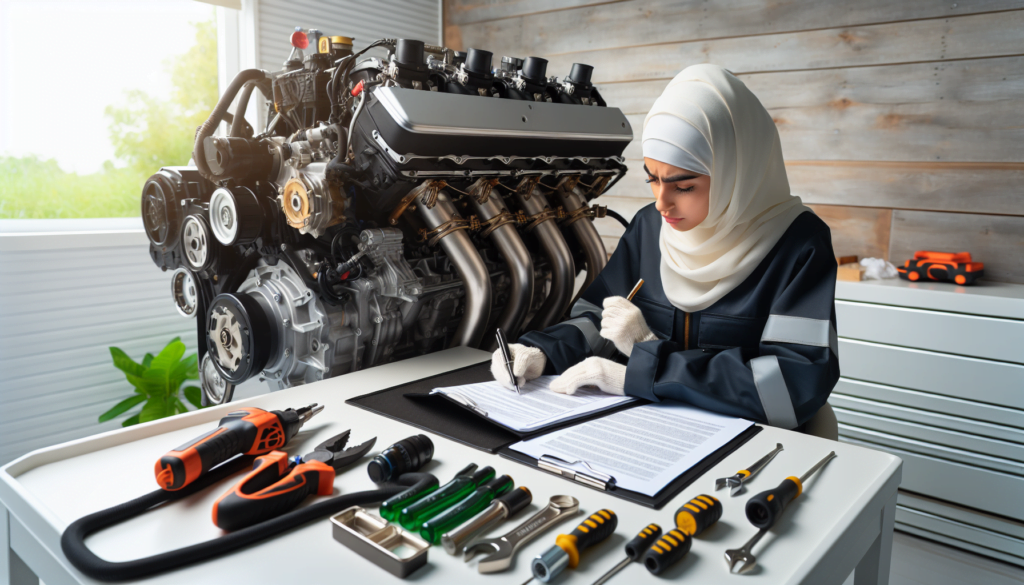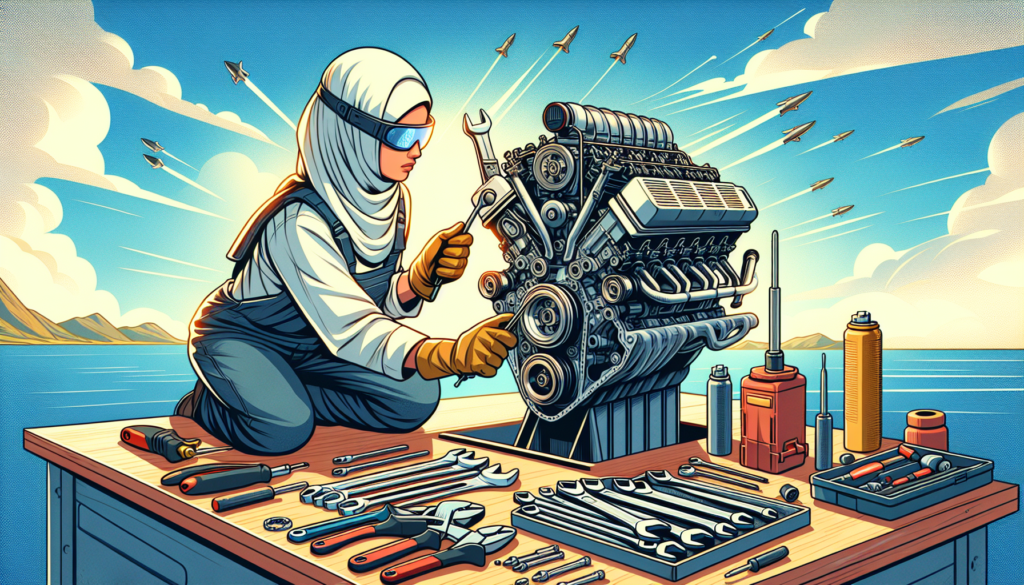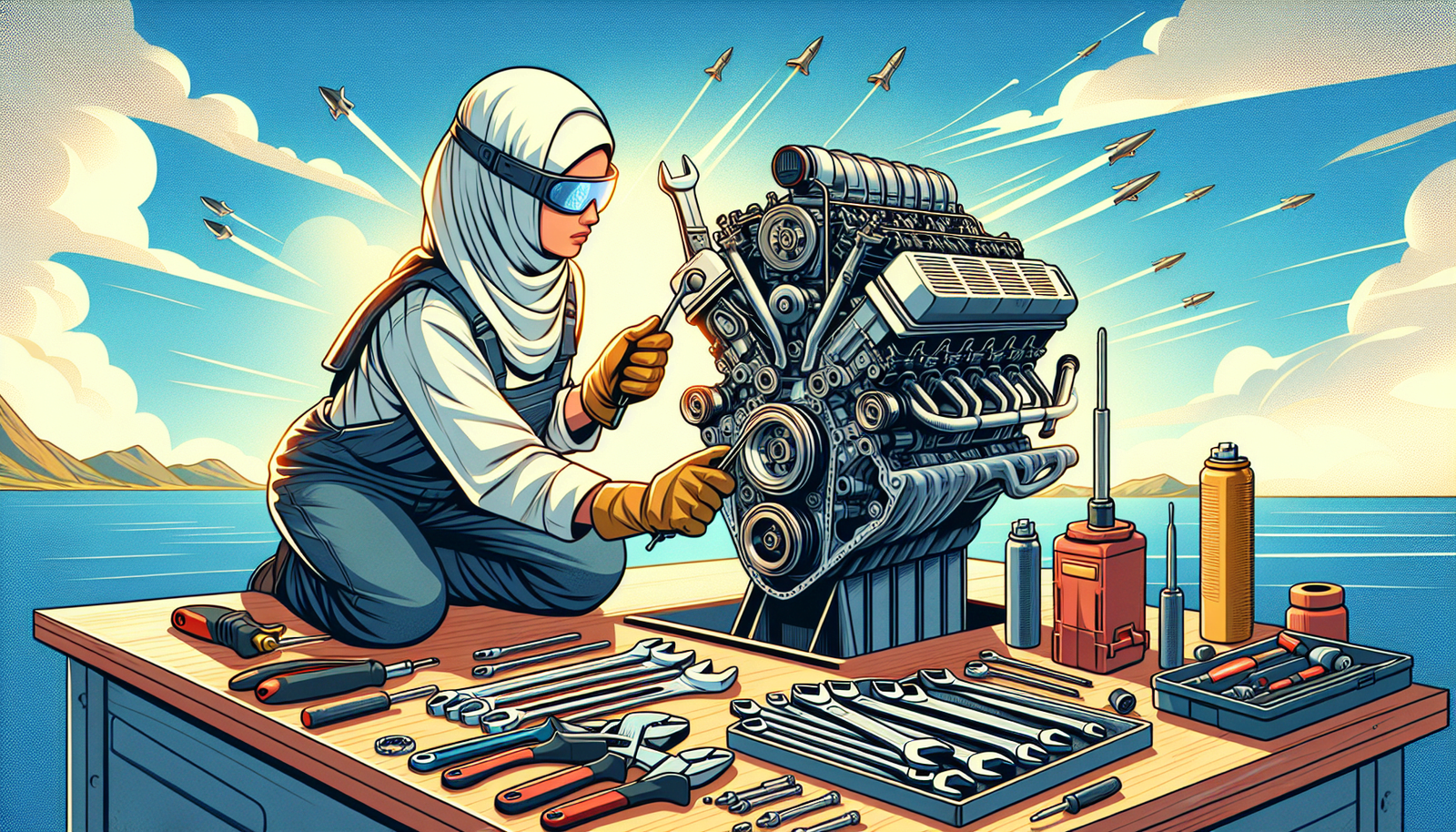As the sun begins to burn brighter and the scent of the sea calls you towards adventure, it’s essential to ensure your beloved boat is well-prepared. “Expert Recommendations for Tuning Up Your Boat Engine for Summer” arms you with the knowledge you need to take a proactive role in caring for your boat’s engine, maximizing its efficiency, and preparing it to withstand the summer heat. Drawn from the vast experience and wisdom of seasoned marine mechanics, these recommendations help you avoid common engine problems during summer boating activities, ensuring not just a smoother sailing experience, but a safer one too.
Understanding Boat Engine Basics
Understanding boat engine basics is crucial for anyone who owns, operates, or is looking to purchase a water vessel. You don’t have to be a mechanic to grasp these basic concepts, you just need a little guidance. This helps to ensure optimum performance, longevity, and overall enjoyment of your watercraft.
Different types of boat engines
There are primarily three different types of boat engines. The first type, outboards, can be easily recognized as they are based outside the hull and can be lifted out of the water. The second type, inboards, are located inside the boat’s hull and propel the boat forward by a shaft. The third type, sterndrives (also known as inboard/outboards), combine the best features of both inboards and outboards, making them versatile and easy to maintain.
Basic engine anatomy
A boat engine, much like a car engine, consists of several parts. This includes the engine block which houses the cylinders, engine head which contains the intake and exhaust valves, and the crankshaft which helps convert linear motion to rotational motion. There’s also a fuel system to provide the necessary fuel for combustion, a cooling system to regulate the engine’s temperature, and an exhaust system to dispose of burnt gases.
Understanding horsepower and propulsion
Horsepower and propulsion are two key concepts that are integral to your understanding of boat engines. Horsepower is the measure of an engine’s power output, and the higher the horsepower, the faster and more powerful your boat will be. Next, propulsion refers to the way your boat moves through the water. Whether it’s jet propulsion, propellers, or paddles, different boats use different methods, each with their own set of advantages and disadvantages.
Importance of Regular Boat Maintenance
Maintaining your boat engine regularly is incredibly crucial. It not just assures your vessel’s longevity but also plays a significant role in guaranteeing safety on waters.
Benefits of regular engine tune-ups
Regular engine tune-ups are akin to regular health check-ups. They help in identifying minor issues before they grow into costly repairs. Regular tune-ups include changing oil, inspecting the propeller, checking the battery, and more. These practices ensure a smoother and more reliable sailing experience.
Potential issues from neglecting maintenance
Neglecting maintenance may lead to various issues. These include inefficient fuel consumption, increased chances of engine breakdown, and reduced engine life. Moreover, unexpected engine failures at sea could risk your safety too.
Seasonal wear and tear
Seasonal wear and tear are a part of owning any vessel. Expect significant damage due to exposure to harsh weather conditions, especially in colder climates. Seasonal boat servicing will help combat these issues.

Pre-Summer Engine Assessment
A pre-summer engine assessment can help ensure your engine is ready to tackle the high usage and additional stress that summer boating season brings.
Conduct a visual inspection
Firstly, conduct a thorough visual inspection of your engine. Check for rust, cracks, leaks, or any equipment that seems out of place. Connect all the wires and look out for worn-out or frayed wires.
Check for obvious leaks or damage
Look for oil, fuel, or coolant leaks around the engine. Inspect the hoses and lines for any signs of breakage or damage. Any change in color or texture might indicate a problem.
Test the engine performance
Finally, test your boat engine’s performance by taking it for a run. Listen to any unusual sounds and check if it’s delivering the required speed and clean exhaust.
Fluids and Lubricants Check
A regularly scheduled fluids and lubricants check is necessary for your boat’s overall performance and efficiency.
Changing the engine oil
Clean engine oil is vital for your boat’s engine. Regularly changing the oil could drastically improve its performance and longevity. A general rule is to change the oil every 50-100 operating hours, depending on your usage and the manufacturer’s recommendation.
Checking and replacing coolant
Regularly checking and replacing your coolant will ensure your engine doesn’t overheat. Coolants absorb the heat and protect your engine from damage due to excessive heat.
Lubricating crucial components
Lubricate all the critical components such as the propellers, gears, and shaft to ensure that they smoothly function and mitigate any metal-on-metal friction.

Fuel System Care
The fuel system is a key component of your boat engine. Regular checks will ensure it’s clean and functioning well.
Draining and replacing fuel
Before the boating season, be sure to drain and replace old fuel. Old or contaminated fuel can clog the engine, reducing its performance.
Cleaning or replacing fuel filters
Regularly cleaning or replacing the fuel filters can prevent unwanted particles or contaminants from reaching the engine.
Inspecting fuel lines and connections for leaks
Regular inspections of the fuel lines and their connections can help avoid dangerous fuel leaks. Examine the fuel lines for any signs of cracking or hardening, and replace them if necessary.
Air Intake and Exhaust System
Maintaining the air intake and exhaust system is vital for ensuring efficient oxygen flow which is essential for combustion.
Cleaning the air intakes
Regularly cleaning the air intakes ensures that the combustion process in your engine is working efficiently, as clogged air intakes restrict the flow of fresh air needed for combustion.
Checking the condition of exhaust manifolds and risers
The condition of exhaust manifolds and risers can be an indication of your engine’s overall health. Any signs of rust or damage may lead to leaks, affecting the engine’s performance.
Inspecting and replacing exhaust bellows if necessary
Exhaust bellows, which connect the exhaust pipe to the stern drive, should be inspected regularly as they are susceptible to cracks and wear. Replace them promptly if found defective to prevent harmful gases from leaking into the boat.
Electrical System and Battery Maintenance
Battery maintenance and electrical system upkeep is another crucial element of regular boat maintenance.
Checking battery connections
Check the battery connections for sturdiness. Ensure the terminals are clean, free from corrosion, and the connections are tight.
Inspecting for corrosion in wires and connections
Corrosion can prevent the flow of electricity, reducing the performance of various components. Regular inspection and cleaning can keep such issues at bay.
Conducting a load test on the battery
A load test will determine the battery’s health and whether it can deliver the necessary power when needed.
Belt, Cable, and Hose Inspection
Belts, cables, and hoses need an equally regular inspection as any other part of your boat engine.
Checking for wear and cracks
Check your belts, cables, and hoses for wear and cracks, as these could lead to equipment failures or leaks.
Testing tension and alignment of belts
A belt should be neither too tight nor too loose. A misaligned or improperly tensioned belt can negatively impact the engine’s performance and lead to premature wear of other components.
Inspecting hoses for signs of swelling or leaks
Inspect the hoses carefully for signs of swelling, hardening, or leaks. A damaged hose can lead to fluid leaks and affect the operation of your boat’s engine.
Propeller and Lower Unit Maintenance
The propeller and lower unit are integral parts of your boat that require regular maintenance.
Inspecting the propeller for damage
Inspect the propeller for any dings, pitting, or cracks. Even minor damage can reduce engine performance and make for a rough ride.
Lubricating the propeller shaft
Lubricating the propeller shaft will ensure that it spins freely and smoothly, reducing friction and the risk of damage to the propeller and the shaft itself.
Checking the lower unit for leaks
The lower unit, which is responsible for propulsion, should be checked for leaks. Fluid leaks could indicate a mechanical failure in the lower unit, which could be disastrous if not addressed promptly.
Boat Engine Storage Post-Summer
Just as prepping your boat engine for summer is essential, so is shutting it down and storing it properly post-summer season.
Engine flushing and storage procedures
Flush your engine with fresh water after your last outing to remove any residual salt or contaminants. Follow proper winterization procedures, which include draining water from the engine, adding fuel stabilizer to the fuel system, and applying fogging oil to the cylinders to prevent corrosion.
Protecting the boat engine from rust
To protect your boat engine from rust during storage, coat its components with an anti-corrosion spray. This prevents moisture build-up and the subsequent rust that would otherwise form during the off-season storage.
Storing the boat correctly to prolong life
Storing your boat correctly can significantly prolong its life. Consider utilizing a covered storage facility or a fitted boat cover to keep out rain, snow, and other elements. This helps to prevent various issues such as mold growth, fading deck, or water-filled bilge.
Remember, owning a boat is a responsibility, and proper maintenance is key. Stay on top of regular engine care, and your boat will reward you with many seasons of problem-free fun on the water.

